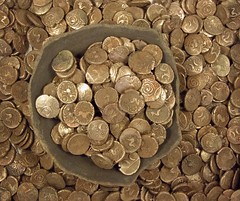
PREV ARTICLE
NEXT ARTICLE
FULL ISSUE
PREV FULL ISSUE
WHAT IS ‘TREASURE'? ASK THE CORONERSo why is it that in England a coroner decides what is declared treasure for the purpose of dividing the proceeds of found coin hoards? Max Hensley forwarded this Atlas Obscura article which traces the historical background. Thanks. -Editor
"Some of the early broader roles are sort of swept away," Lockwood adds, "so we're left with treasure trove and investigating untimely deaths." It is still up to coroners—who weren't particularly associated with having medical knowledge until the 1800s—to distinguish between deaths accidental, natural, and foul, and to distinguish between trinket and treasure. "It's very obscure," Lockwood says, "but at the same time it's a bizarre holdover from a previous age that doesn't seem like it should exist in the modern age, but it does." What is treasure and what is not was a significant distinction as far back as the Roman Empire, when treasure was defined, rather specifically, as a horde of money that has been buried so long an owner cannot be identified. It has been a subject of English law as far back as Edward the Confessor, who reigned in the early 11th century. And today, naming something as treasure still carries profound implications. "Prior to [1996], it was very loose and in order for something to be classed as ‘treasure trove,' a find had to be predominantly gold and silver. Its original owners had to be unknown, but it also had to be buried with the intention of future recovery," says Richardson, who sorts though hundreds of treasure inquiries each year passed to him by local municipalities. "It means that in practice the majority of things classed as ‘treasure trove' were coin hoards, obviously put in the ground by people with the hopes of recovering later and they never did." To read the complete article, see:
 Wayne Homren, Editor The Numismatic Bibliomania Society is a non-profit organization promoting numismatic literature. See our web site at coinbooks.org. To submit items for publication in The E-Sylum, write to the Editor at this address: whomren@gmail.com To subscribe go to: https://my.binhost.com/lists/listinfo/esylum All Rights Reserved. NBS Home Page Contact the NBS webmaster 
|
